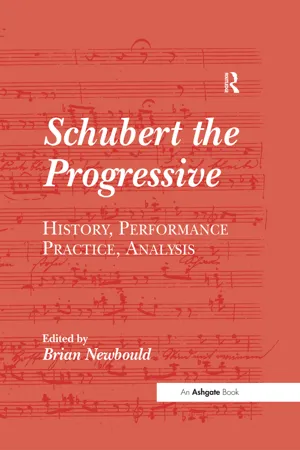
- 200 pages
- English
- ePUB (mobile friendly)
- Available on iOS & Android
eBook - ePub
About this book
The eleven essays that comprise this volume represent some of the most significant strands of current Schubert research. Arising from an international conference organized by the Schubert Institute (UK) and the University of Leeds in 2000, the emphasis of the papers is on issues of performance practice, analysis and hermeneutics. In the opening essay of the book, Charles Rosen illuminates some of Schubert's compositional practices and their implications for performers. Further performance problems are explored by Walther D rr who highlights the paradox between Schubert's precise notation of pitches and rhythm and his imprecision in relation to dynamics and articulation. As Roy Howat makes clear in his essay, the performer needs to read between the lines of even the best Schubert editions.Aspects of Schubert's style are explored in other essays. Clive McClelland discusses the composer's use of ombra style, while Brian Newbould examines Schubert's techniques of compression and expansion as illustrated in his dances and in sonata movements. Robert Hatten explores the G major Piano Sonata as pastoral, and James Sobaskie and Nicholas Rast provide complementary analyses of the A minor Quartet.The organization of musical time in Schubert and his relationship in this regard to later composers is the subject of Susanne Kogler's essay, while Walburga Litschauer discusses Schubert's early piano sonatas and previously unknown versions of them. Various enigmas surrounding Schubert's life and music are discussed by Roger Neighbour.With contributions from both internationally acclaimed and younger scholars, this volume represents a further step in the multifaceted direction that Schubert research is taking.
Tools to learn more effectively

Saving Books

Keyword Search

Annotating Text

Listen to it instead
Information
Subtopic
MusicTable of contents
- Cover
- Half Title
- Title
- Copyright
- Contents
- List of Music Examples
- List of Figures and Tables
- Preface
- Notes on Contributors
- 1 Schubert and the Example of Mozart
- 2 Death and the Composer: The Context of Schubert's Supernatural Lieder
- 3 Notation and Performance: Dynamic Marks in Schubert's Manuscripts
- 4 Tonal Implication and the Gestural Dialectic in Schubert's A Minor Quartet
- 5 'Schöne Welt, wo bist du?': Motive and Form in Schubert's A Minor String Quartet
- 6 'Timelessness' and 'Released Time' Franz Schubert and Composition Today
- 7 Unknown Versions of Schubert's Early Piano Sonatas
- 8 Cornered in the Middle Eight: Dance Miniaturism vis-à-vis Sonata
- 9 Reading between the Lines of Tempo and Rhythm in the B Flat Sonata, D960
- 10 The Doppelgänger Revealed?
- 11 Schubert's Pastoral: The Piano Sonata in G Major, D894
- Appendix
- General Index
- Index of Works by Schubert Referred to in the Text
Frequently asked questions
Yes, you can cancel anytime from the Subscription tab in your account settings on the Perlego website. Your subscription will stay active until the end of your current billing period. Learn how to cancel your subscription
No, books cannot be downloaded as external files, such as PDFs, for use outside of Perlego. However, you can download books within the Perlego app for offline reading on mobile or tablet. Learn how to download books offline
Perlego offers two plans: Essential and Complete
- Essential is ideal for learners and professionals who enjoy exploring a wide range of subjects. Access the Essential Library with 800,000+ trusted titles and best-sellers across business, personal growth, and the humanities. Includes unlimited reading time and Standard Read Aloud voice.
- Complete: Perfect for advanced learners and researchers needing full, unrestricted access. Unlock 1.4M+ books across hundreds of subjects, including academic and specialized titles. The Complete Plan also includes advanced features like Premium Read Aloud and Research Assistant.
We are an online textbook subscription service, where you can get access to an entire online library for less than the price of a single book per month. With over 1 million books across 990+ topics, we’ve got you covered! Learn about our mission
Look out for the read-aloud symbol on your next book to see if you can listen to it. The read-aloud tool reads text aloud for you, highlighting the text as it is being read. You can pause it, speed it up and slow it down. Learn more about Read Aloud
Yes! You can use the Perlego app on both iOS and Android devices to read anytime, anywhere — even offline. Perfect for commutes or when you’re on the go.
Please note we cannot support devices running on iOS 13 and Android 7 or earlier. Learn more about using the app
Please note we cannot support devices running on iOS 13 and Android 7 or earlier. Learn more about using the app
Yes, you can access Schubert the Progressive by Brian Newbould in PDF and/or ePUB format, as well as other popular books in Media & Performing Arts & Music. We have over one million books available in our catalogue for you to explore.